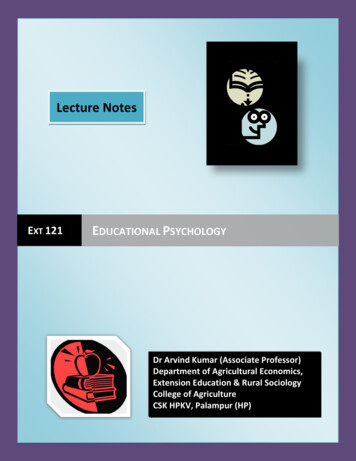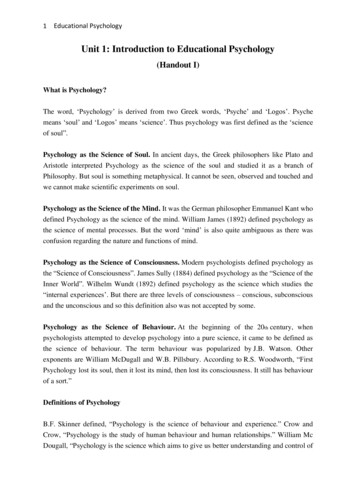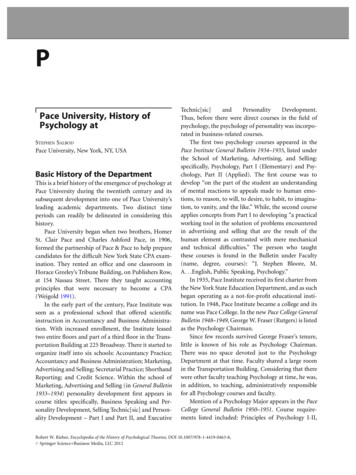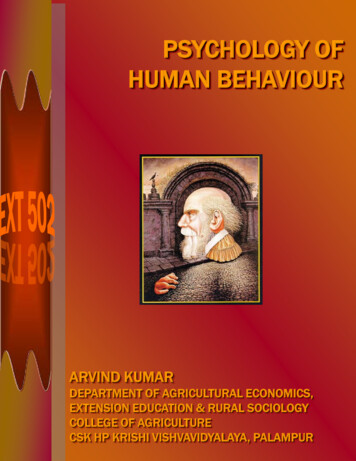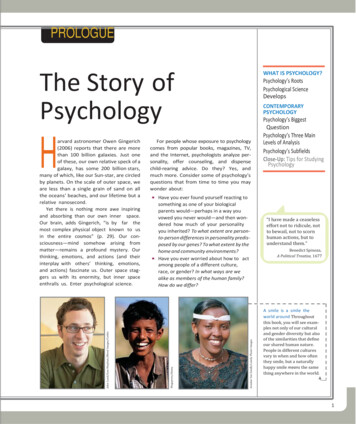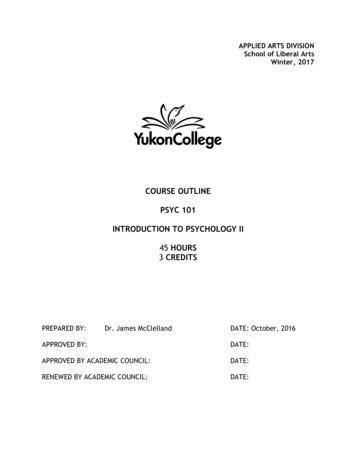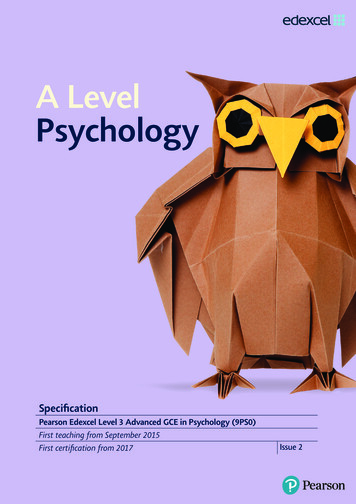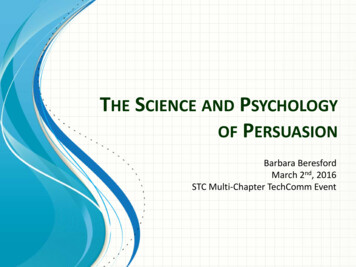
Transcription
THE SCIENCE AND PSYCHOLOGYOF PERSUASIONBarbara BeresfordMarch 2nd, 2016STC Multi-Chapter TechComm Event
Table of Contents OverviewUnderstanding persuasionScience and psychology of human behaviorReason vs. emotion in behavior and decisionsNon-verbal communication and body languageArt of listening
My Background M.A. in Theater, 1 yr. of Ph.D study 23 years as technical writer/editor, including13 yrs. at MorphoTrust USA President, Society for TechnicalCommunication (STC), Twin Cities chapter
I’m Fascinated with Persuasion! I’m not a scientist or a psychologist! I’m atechnical writer and editor. I kept getting stuckon why peoplebehave the waythey do.By Titus Tscharntke [Public domain], via Wikimedia Commons
Persuasion A form of social influence. The process of guidingoneself or another toward adopting an idea, attitude,or action by rational and symbolic (though not alwayslogical) means.www.wikipedia.com The ability to induce beliefs and values in others usingspecific strategies.Kevin Hogan To persuade is “to prevail on (a person) to dosomething, as by advising or urging.”www.dictionary.com
Laws of Persuasion1.2.3.4.5.6.7.8.9.Law of ReciprocityWhen someone gives you something with a perceived value, you respond with the desire togive something back.Law of ContrastIf two items are different, they appear more different when placed close together in time andspace.Law of FriendsWhen someone asks you to do something and you perceive that they have your best interest atheart, you are strongly motivated to do it.Law of ExpectancyWhen someone you believe in expects you to do something, you will tend to do it.Law of AssociationWe like products, services, and ideas endorsed by people we respect.Law of ConsistencyWhen someone announces a stand on an issue, he or she will defend the stand.Law of ScarcityWhen someone perceives that a desired object is scarce, the object increases in value.Law of ConformityMost people agree to proposals that would be acceptable to a majority of others in their peergroup.Law of PowerPeople have power over others to the degree that they are perceived as having greaterauthority, strength, or expertise.
The Persuasion Process Establish trust and credibility with the person Find out about what the otherperson wants, needs, and values. Listen to the other person tohear what is being said. Pay attention to both verbal andnonverbal messages. Communicate that you genuinely care about himor her, and that your goal will be beneficial to bothof you.
Persuasion and Influence Dale Carnegie, How to Win Friends and InfluencePeople, 1936 Basic, common-sense guidelines:––––Don't criticize, condemn, or complain.Give honest and sincere appreciation.Encourage others to talk about themselves and listen.Make the other person feel important – and do itsincerely. Learn to manage emotions and honestly try tounderstand the other person’s needs
Persuasion and WIN/WIN A life philosophy Focus on other person’sneeds, values, and desires The Double WinDennis Waitley,The Psychology of Winning If it isn’t WIN/WIN,it is NO DEALSteven Covey,7 Habits of Highly Effective PeopleBy Clintus from Surprise, AZ, USA (Milkshake buddies Uploaded by JohnnyMrNinja) [CC-BY-SA-2.0 ia Wikimedia Commons
Definition of Psychology Science of the mind or of mental states andprocesses. Used “to understand individuals and groupsby both establishing general principles andresearching specific cases.”www.wikipedia.comBy Scan by de:Benutzer:Summi edited by "Wolfgang" [Public domain], via Wikimedia Commons
Science of Human Behavior The Power of Habit, Charles Duhigg, 2012 Humans are creatures of habit. The brain says “No!” to all butthe most familiar requests orbehaviors. A majority of our behavior ishabitual, using well-establishedwiring in the brain. New behavior starts new neural pathways. It takes5-30 days (repeated daily) to form a new habit. But the old wiring remains in place!
Psychology of Human Behavior How does a person react when you say: “You should do that!” We don’t really know ourselves. Strangers are almost as goodat predicting our behavior as we are. We don’t really know what wewant. (We think we know whatwe want—what will make ushappy, but when we get it,we don’t feel the way wethought we would!) We see ourselves in a betterlight than we see others.By Craig Sunter from Manchester, UK [CC-BY-2.0 (http://creativecommons.org/licenses/by/2.0)], via Wikimedia Commons
We Have Two MindsConsciousUnconscious idObserves and analyzesDetects patterns and typesThinks about decisionsMakes rapid fire decisions(fight or flight?)Wants to be accurateWants to feel good and avoid painCan consider, make changesAfraid of changesSets goals, pursues goalsReacts to environmentSensitive to positive informationSensitive to negative information
The First Few Seconds We unconsciously assess a person, noting firstimpressions within seconds of seeing them.–––––– Who is she like?Is that good?Is she attractive?What’s unique about her?What’s familiar about her?Does she have a high or lowstatus in this group?We make a thumbs up orthumbs down judgment onthe personMost people get a No--even before eye contact or helloThis is normal human behavior-expect it!
Is Reason or Emotion in Charge? The rational mind has traditionally beenconsidered key in decision-making Plato had metaphor of chariot driver with horses:– Reason is the charioteer (the thinking mind)– Emotions are the horses (the animal mind, which mustbe controlled). The Enlightenment– Descartes: I think, therefore I am.Walters Art Museum [Public domain, CC-BY-SA-3.0 (http://creativecommons.org/licenses/bysa/3.0) or GFDL (http://www.gnu.org/copyleft/fdl.html)], via Wikimedia Commons
Research on the Loss of Emotion Antonio Damasio, Descartes’ Error: Emotion, Reason, and theHuman Brain, 1990s Patient had surgery to remove a tumor; his intellect remainedthe same; his emotions were lost; he lost the ability to makedecisions and function socially; his life fell apart Similar case in 1800s with a railroadforeman who suffered a head injury;damaged part of brain involved insocial conventions, ethical rules,personal and social dimensions. Breakthrough in understanding thekey role that emotions play in making decisions.By Roman Pavlyuk from New York, USA (Eyes) [CC-BY-2.0 (http://creativecommons.org/licenses/by/2.0)], via Wikimedia Commons
Emotions in Making Decisions Jonah Lehrer, How We Decide, 2009: our best decisions are ablend of both feeling and reason. Example of emotions in deciding fromhighly experienced radar operator onBritish ship during 1st Iraq War– Neuroscience: our brain is designed forlearning from predictions.– To get better at something, search for yourerrors, and dissect decisions that could havebeen a little better. Other situations require more reason (and less emotion)– People gamble on slot machines, pick the wrong stocks, and run upexcessive credit card debt – you can’t learn from predicting hereBy Smith6 (Own work) [CC-BY-SA-3.0 (http://creativecommons.org/licenses/by-sa/3.0)], via Wikimedia Commons
Emotions in Making Decisions Jonathan Haidt, The Righteous Mind: Why Good People are Divided byPolitics and Religion, 2012. Metaphor: the elephant (emotion and intuition) and the rider(reasoning). People have gut feelings, like disgust or disrespect, that drive theirmoral judgments. We make judgments rapidly, intuitively,and we are good at making up stories toexplain our judgments. To change someone’s mind, especiallyon a moral matter, you’ve got to talkto their elephant Empathy is an antidote to righteousness.Dotuanhungdaklak at vi.wikipedia [GFDL (http://www.gnu.org/copyleft/fdl.html) or CC-BY-SA-3.0 (http://creativecommons.org/licenses/bysa/3.0/)], from Wikimedia Commons
Emotional Intelligence Daniel Goleman, Emotional Intelligence, 2005– Being self-aware of your own emotions– Managing your emotions– Motivating yourself (self-discipline)– Recognizing emotions in others– Handling relationships Self-control with managingemotions is a better predictorof success in life than IQAdmiration, Karl Witkowski
Nonverbal Communication 93% of communication is beyond the words– Words (7%), tone of voice (38%),and body language (55%) Congruency for verbal/nonverbal messages– A person says: “No, I didn’t doit,” but subtly nods their headyes is not congruent. Microexpressions– In press conference, Susan Smith (no real tears; no foreheadtension) says we have to get our boys back; her husband saysthe same thing, but shows tension and emotion on across hisforeheadBy Chuksemeka (Own work) [CC-BY-SA-3.0 (http://creativecommons.org/licenses/by-sa/3.0)], via Wikimedia Commons
Body Language If words contradict body language; the body languagemessage is more powerful When trying to influence someone:– Pay attention to your physical positioning– Use rapport for physical appearance, vocal cues, posture,physiology, and breathing If you act powerfully, you begin tothink powerfully*By Simon [CC-BY-2.0 (http://creativecommons.org/licenses/by/2.0)], via Wikimedia Commons
The Art of Listening The Zen of Listening, Victoria Shafir, 2000– Speech-language pathologist– A 69 yr. old man showed up at the end of the day– She listened to him for15 minutes– His doctor reportedback, and asked abouther meeting with the manImagicity.com [CC-BY-SA-3.0 (http://creativecommons.org/licenses/by-sa/3.0)], via Wikimedia Commons
Not Listening Listening selectively to what we want to hear Telling others what theydon’t seem to understand Asking too many questions Judging people badly ordismissing them if they donot do what we recommend.(Then we waste time byreinforcing and re-explainingour point of view.) If you don’t get to know where someone is really coming from(background, expectations), you can’t understand him or her and trustwill be gone.By Jesslee Cuizon from Fujisawa, Japan (you're not listening) [CC-BY-2.0 (http://creativecommons.org/licenses/by/2.0)], via Wikimedia Commons
Listening Willingness to try and see the world through the eyes ofthe speaker– The Magic “If”: If I were that person, how would I feel, what wouldscare me, what would I want, etc.? When a person is given a chanceto tell his views without thethreat of judgment or advice(even if you do not agree), youhave taken the first step towardcreating good feelingsBy Jackie ohlsen [CC-BY-SA-3.0 (http://creativecommons.org/licenses/by-sa/3.0) orGFDL (http://www.gnu.org/copyleft/fdl.html)], via Wikimedia Commons
Attentive Listening is Beneficial Heart rate and oxygen consumption is reduced,blood pressure is lowered. Contact with otherspromotes well-beingand self-expression(good for you health). You can promote thegood health of othersby listening to them,affirming theirperspective, andreducing their stress.By Birhanb (Own work) [CC-BY-SA-3.0 (http://creativecommons.org/licenses/by-sa/3.0)], via Wikimedia Commons
Closing Thoughts Our behavior is much more influenced by ourunconscious mind than our conscious mind(90% and 10%?). Our emotions play a large role in decision-making, suchas helping us to learn from mistakes when ourpredictions are wrong. Persuade by starting with yourself:– Make the most of your appearance– Ask yourself, how am I coming across; how do I sound? Then imagine what it feels like to be the other person:– Ask yourself how he/she thinks and feels– Listen and watch for what he/she is really saying
QUESTIONS?babs7344@Hotmail.com
Kevin Hogan, The Science of Influence, The Psychology of Persuasion. Laws of Persuasion. 1. Law of Reciprocity. When someone gives you something with a perceived value, you respond with the desire to give something back. 2. Law of Contrast. If two items are different, they app


